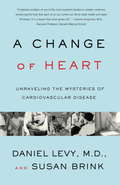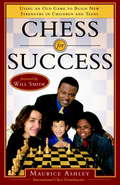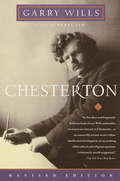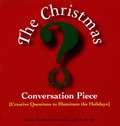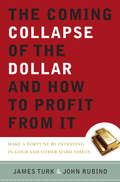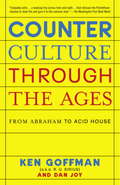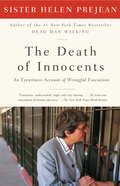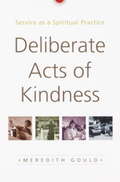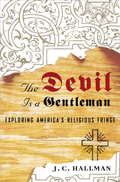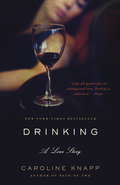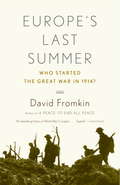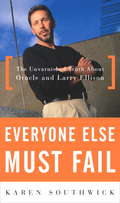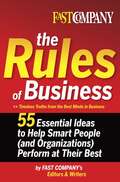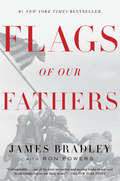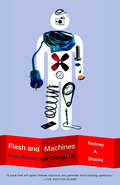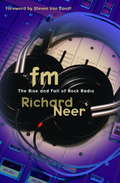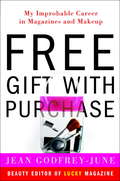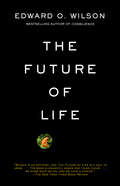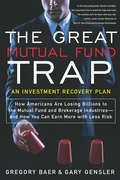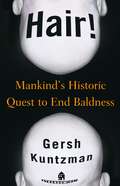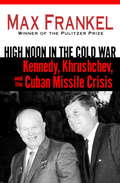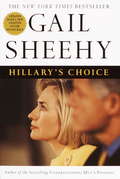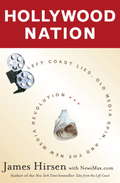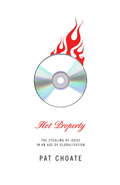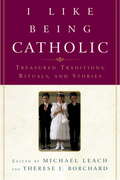- Table View
- List View
Change of Heart
by Daniel LevyA Change of Heartis a detailed account of the revolutionary Framingham Heart study -- which, over the years, has provided conclusive evidence that cardiovascular disease is largely the result of measurable and modifiable risk factors. First begun in 1948, not long after Franklin Delano Roosevelt succumbed to a massive stroke, the study of over 5,000 citizens of Framingham, Massachusetts, changed the course of medical history. The lessons learned in Framingham allow each of us to control our risk of heart disease and stroke, two of the leading causes of death in the United States. Here is a clear-eyed and intriguing assessment of the achievements of this study and of its continuing importance to our health today.
Chess for Success
by Maurice Ashley International Chess GrandmasterMaurice Ashley immigrated to New York from Jamaica at the age of twelve, only to be confronted with the harsh realities of urban life. But he found his inspiration for a better life after stumbling upon a chess book and becoming hypnotized by the game. He would eventually break the chess world's color lines by becoming an International Grandmaster in 1999. Ashley realized that chess strategies could be used as an educational tool to help children avoid the pitfalls often associated with growing up. In this book, he serves up compelling anecdotes about how chess has positively affected young players. He also offers tips on technique, how to make the game fun for children of all ages and levels, and how to overcome the myth that chess isn't cool. Through his guidance, readers will understand how chess strategies can improve a child's mental agility, creativity, and problem-solving skills. Chess for Successis a much-anticipated resource for parents, teachers, counselors, youth workers, and chess lovers.
Chesterton
by Garry Wills"Part of a literary circle that included H. G. Wells, George Bernard Shaw, Hillaire Belloc, and Max Beerbohm, G. K. Chesterton (1874-1936) wrote essays of social criticism for contemporary journals, literary criticism (including notable books on Browning, Dickens, and Shaw), and works of theology and religious argument, but may have been best known for his Father Brown mysteries. Chesterton's interest in Catholic Christianity, first expressed in Orthodoxy, led to his conversion from Anglicanism to Roman Catholicism in 1922. His classic Saint Francis of Assisi and the equally acclaimed Saint Thomas Aquinas confirmed his reputation as a writer with the rare ability to simultaneously entertain, inform, and enlighten readers. This revised edition of Garry Wills's finely crafted biography includes updates to the text and a new Introduction by the author. "--BOOK JACKET. Title Summary field provided by Blackwell North America, Inc. All Rights Reserved
Christmas Conversation Piece
by Bret Nicholaus Paul LowrieWhat one Christmas tradition would you never want to give up? If you could spend Christmas anywhere in the world, where would you most want to be? If you could have visited the Christ child just as the Three Kings did, what would you have brought as a gift? You've been chosen to host a sensational Christmas celebration on TV: What three guests would you choose to make it the best Christmas special ever? The Christmas Conversation Pieceoffers these and many other questions to pose and ponder during a season of both deep reflection and unabashed merriment. This charming volume--the perfect stocking stuffer--will provide you, your family, and your friends with twelve days of surprising and amusing Yuletide questions. Who would you most like to meet under the mistletoe? Your answer just may change by Christmas Eve!
The Coming Collapse of the Dollar and How to Profit From It
by James Turk John RubinoPeriodically, the global economy shifts gears in a fundamental way, turning conventional wisdom on its head and producing new categories of winners and losers among investors.
Counterculture Through the Ages
by Ken Goffman Dan JoyAs long as there has been culture, there has been counterculture. At times it moves deep below the surface of things, a stealth mode of being all but invisible to the dominant paradigm; at other times it’s in plain sight, challenging the status quo; and at still other times it erupts in a fiery burst of creative–or destructive–energy to change the world forever. But until now the countercultural phenomenon has been one of history’s great blind spots. Individual countercultures have been explored, but never before has a book set out to demonstrate the recurring nature of counterculturalism across all times and societies, and to illustrate its dynamic role in the continuous evolution of human values and cultures. Countercultural pundit and cyberguru R. U. Sirius brilliantly sets the record straight in this colorful, anecdotal, and wide-ranging study based on ideas developed by the late Timothy Leary with Dan Joy. With a distinctive mix of scholarly erudition and gonzo passion, Sirius and Joy identify the distinguishing characteristics of countercultures, delving into history and myth to establish beyond doubt that, for all their surface differences, countercultures share important underlying principles: individualism, anti-authoritarianism, and a belief in the possibility of personal and social transformation. Ranging from the Socratic counterculture of ancient Athens and the outsider movements of Judaism, which left indelible marks on Western culture, to the Taoist, Sufi, and Zen Buddhist countercultures, which were equally influential in the East, to the famous countercultural moments of the last century–Paris in the twenties, Haight-Ashbury in the sixties, Tropicalismo, women’s liberation, punk rock–to the cutting-edge countercultures of the twenty-first century, which combine science, art, music, technology, politics, and religion in astonishing (and sometimes disturbing) new ways, Counterculture Through the Ages is an indispensable guidebook to where we’ve been . . . and where we’re going.
The Death of Innocents
by Helen PrejeanFrom the author of the national bestseller Dead Man Walking comes a brave and fiercely argued new book that tests the moral edge of the debate on capital punishment: What if we're executing innocent men? Two cases in point are Dobie Gillis Williams, an indigent black man with an IQ of 65, and Joseph Roger O'Dell. Both were convicted of murder on flimsy evidence (O'Dell's principal accuser was a jailhouse informant who later recanted his testimony). Both were executed in spite of numerous appeals. Sister Helen Prejean watched both of them die.As she recounts these men's cases and takes us through their terrible last moments, Prejean brilliantly dismantles the legal and religious arguments that have been used to justify the death penalty. Riveting, moving, and ultimately damning, The Death of Innocents is a book we dare not ignore.From the Trade Paperback edition.ng on the forensic evidence, which he claimed would exonerate him, but the courts refused. After his execution on July 23, 1997, the state destroyed the evidence. As a result, its conviction of O'Dell could never be scrutinized. "The reader of this book will be the first 'jury' with access to all the evidence the trial juries never saw," says Prejean, who accompanied both men to their executions. By using the withheld evidence to reconstruct the crimes for which these two men were convicted, Prejean shows how race, prosecutorial ambition, poverty, election cycles, and publicity play far too great a role in determining who dies and who lives.Prejean traces the historical underpinnings of executions in this country, demonstrating that it is no accident that over 80 percent of executions in the past twenty-five years have been carried out in the former slave states. She also raises profound constitutional questions about an appeals system that decides most death cases on procedural grounds without ever examining their merits.To date, 113 wrongfully convicted persons have been freed from death row. If constitutional protections-due process, assistance of counsel, and equal justice under law-are truly being respected, how is it possible that these people were convicted in the first place? And how can we accept a system so rife with error?Sister Helen Prejean takes us with her on her spiritual journey as she accompanies two possibly innocent human beings to their deaths at the hands of the state. Prejean implores us to reflect on what is perhaps the core moral issue of the death penalty debate: Honorable people disagree about the justice of executing the guilty, but can anyone argue about the injustice of executing the innocent?From the Hardcover edition.
Deliberate Acts of Kindness
by Meredith GouldAn indispensable guide to the spiritual and the practical aspects of devoting one’s time and energies to the service of others. Deliberate Acts of Kindnessis for people who are ready to supplement"random acts of kindness" with intentional acts of generosity, decency, and integrity. More than simply a handbook for volunteers, it explores the significance of service as an expression of spirituality and the commitment to something greater than oneself. Meredith Gould guides readers through their journeys, from recognizing when they are ready to answer the call to service to finding the right place to donate their time and talents. She offers invaluable advice on discovering the types of work that best suit their personalities and the areas in which they can make the greatest contributions. There is helpful information on how to get involved, as well as sensible suggestions about what to do when things go wrong in a service situation. An easy-to-read mix of tips, quotations, reflections, and short narrative passages,Deliberate Acts of Kindnesspresents a comprehensive, honest look at what service is like on a day-to-day basis. Its insights will help new volunteers and veterans alike negotiate the practical difficulties that sometimes arise and achieve the spiritual maturity that comes from answering the call to service. From the Trade Paperback edition.
The Devil Is a Gentleman
by J. C. HallmanA hundred years ago, the writer and philosopher William James wrote The Varieties of Religious Experience, a seminal work that has inspired generations of scholars and eccentrics alike. James’s book argues that the religious spirit in man is best understood through the study of its most extreme forms. Varieties was a watershed effort: a bestselling portrait of history’s pluralism and a defense of the spiritual quest, in all its guises, against the era’s increasingly secular sentiments. Today, with all the old tensions between skeptics and believers still in place, J. C. Hallman pays homage to James’s exploration of offbeat religious movements. But where James relied on the testimony and biographies of prophets and mystics, Hallman travels directly to some of America’s newest and most unusual religions, trekking from Druid circles in the mossy hills of northern California to the gleaming mother church of Scientology, from lurid satanic cellars in undisclosed locations to a professional-wrestling ministry in the fundamentalist heart of Texas. Along the way, he participates in a variety of rites and reports on a broad spectrum of beliefs. Eventually Hallman adopts James as his patron saint, spiritual adviser, and intellectual companion on the journey that will culminate in the creation of this book, a compelling combination of adventure and biography, spotted with hair-raising predicaments and rife with poignant portraits of unforgettable characters, including William James himself. The Devil Is a Gentlemanmaps the spiritual contours of modern American pluralism and examines the life and legacy of one of its most profound architects. From the Hardcover edition.
Drinking: A Love Story
by Caroline KnappFifteen million Americans a year are plagued with alcoholism. Five million of them are women. Many of them, like Caroline Knapp, started in their early teens and began to use alcohol as "liquid armor," a way to protect themselves against the difficult realities of life. In this extraordinarily candid and revealing memoir, Knapp offers important insights not only about alcoholism, but about life itself and how we learn to cope with it.
Europe's Last Summer: Who Started the Great War in 1914?
by David FromkinThe Great War not only destroyed the lives of over twenty million soldiers and civilians, it also ushered in a century of huge political and social upheaval, led directly to the Second World War and altered for ever the mechanisms of governments. And yet its causes, both long term and immediate, have continued to be shrouded in mystery. In EUROPE'S LAST SUMMER, David Fromkin reveals a new pattern in the happenings of that fateful July and August, which leads in unexpected directions. Rather than one war, starting with the assassination of Archduke Franz Ferdinand, he sees two conflicts, related but not inseparably linked, whose management drew Europe and the world into what The Economist described as early as 1914 as 'perhaps the greatest tragedy in human history'.
Everyone Else Must Fail
by Karen SouthwickKaren Southwick's unauthorized account provides the full story of Larry Ellison's brilliant, controversial career. Ellison's drive and fierce ambition created Oracle out of the dust and built it into one of America's great technology companies, but his unpredictable management style keeps it constantly on the edge of both success and disaster. The hostile bid for PeopleSoft is just the most recent example. With one clever strategic move, Larry Ellison threw much of the business software field into play. The saying "It's not enough that I succeed, everyone else must fail" has been so often used by or associated with Ellison that most people think it originated with him. It's actually attributed to Genghis Khan, but it's a dead-on way to describe not only the way Ellison thinks about competitors but the way he runs Oracle. His weapons are not marauding hordes, but Oracle's possession of database technology that is crucial for keeping mission-critical information flows working at thousands of organizations, corporations, nonprofits, and government agencies. Inside Oracle, Ellison has time and again systematically purged key operating, sales, and marketing people who got too powerful for his comfort. Most notable was Ray Lane, Oracle's president for nine years, who was widely credited with bringing order out of the chaos that was Oracle in the early nineties and growing it into a ten billion dollar company. Ellison got rid of the one key person who was building confidence with Wall Street, business partners, and customers that Oracle was no longer flying by the seat of its pants and had its act together. Ellison's mania for absolute control and his inability to coexist with the very lieutenants who bring much-needed stability to the company have brought Oracle to the brink of collapse before, and may well do it again. Ellison is a throwback to an earlier, much more freewheeling version of capitalism, the kind practiced by the nineteenth-century robber barons who ran their companies as private fiefdoms. Larry Ellison is one of the most intriguing and dominant leaders of a major twenty-first-century corporation, and Everyone Else Must Fail raises the question of whether Oracle's products and the reliance placed in them by so many are too important to be subject to the whims of one man. While giving credit to Ellison's brilliance and devotion, the book sounds a warning about an ingenious man's tendency to be his own company's worst enemy.
Fast Company The Rules of Business: 55 Essential Ideas to Help Smart People (and Organizations) Perform At Their Best
by Fast Company's Editors and WritersFrom The Rules of BusinessRule #1 The first rule of business is the same as the first rule of life: Adapt or die."What gets measured, gets done."--Peter DruckerRule #8 Nothing is more overrated than a new idea. Ideas by themselves are worthless. It's what you do with them that matters."Bet on the jockey, not on the horse." --Malcolm Forbes "Best practices usually aren't."--Christopher Locke, co-author, The Cluetrain ManifestoRule #49 If it is not right, don't do it; if it is not true, don't say it. "If you think you're too small to have an impact, try going to bed with a mosquito in the room."--Dame Anita Roddick, founder, The Body ShopIn THE RULES OF BUSINESS, Fast Company's renowned editor in chief, John Byrne and the writers and editors of Fast Company, distill the major ideas and principles of the world of business into fifty-five essential rules. These rules are elaborated on and enhanced by quotes and insights from over 200 business leaders, practitioners, and thinkers into what is sure to be an essential desk reference for managers, professionals, and executives-to-be.Published on the tenth anniversary of the magazine, FAST COMPANY'S THE RULES OF BUSINESS features the essential principles behind today's most important business topics, from customer service to innovation, from strategic thinking to leadership and management. The book introduces each category with a two-page commentary, and weaves two to four essential rules throughout every chapter. At the end of each chapter a boxed, bulleted "Fast Take" section gives readers specific takeaways they can use in their day-to-day work. The heart of each chapter, however, is the quotes and insights on the subject culled from the great minds in business, both living and historical--leaders and thinkers such as Machiavelli and Jack Welch, Adam Smith and his invisible hand and Tom Peters on marketing Me, Inc., Michael Porter on (what else?) strategy and A.G. Lafley, Jeff Bezos on the perils of hiring the wrong person and Bill Gates on the value of information technology, Anne Mulcahy and Warren Buffett, and many more.FAST COMPANY'S THE RULES OF BUSINESS is the ultimate desk reference.
Flags of Our Fathers: A Young People's Edition (Playaway Adult Nonfiction Ser.)
by James Bradley Ron PowersIn this unforgettable chronicle of perhaps the most famous moment in American military history, James Bradley has captured the glory, the triumph, the heartbreak, and the legacy of the six men who raised the flag at Iwo Jima. Here is the true story behind the immortal photograph that has come to symbolize the courage and indomitable will of America. In February 1945, American Marines plunged into the surf at Iwo Jima—and into history. Through a hail of machine-gun and mortar fire that left the beaches strewn with comrades, they battled to the island's highest peak. And after climbing through a landscape of hell itself, they raised a flag. Now the son of one of the flagraisers has written a powerful account of six very different young men who came together in a moment that will live forever. To his family, John Bradley never spoke of the photograph or the war. But after his death at age seventy, his family discovered closed boxes of letters and photos. InFlags of Our Fathers, James Bradley draws on those documents to retrace the lives of his father and the men of Easy Company. Following these men's paths to Iwo Jima, James Bradley has written a classic story of the heroic battle for the Pacific's most crucial island—an island riddled with Japanese tunnels and 22,000 fanatic defenders who would fight to the last man. But perhaps the most interesting part of the story is what happened after the victory. The men in the photo—three were killed during the battle—were proclaimed heroes and flown home, to become reluctant symbols. For two of them, the adulation was shattering. Only James Bradley's father truly survived, displaying no copy of the famous photograph in his home, telling his son only: "The real heroes of Iwo Jima were the guys who didn't come back. " Few books ever have captured the complexity and furor of war and its aftermath as well asFlags of Our Fathers. A penetrating, epic look at a generation at war, this is history told with keen insight, enormous honesty, and the passion of a son paying homage to his father. It is the story of the difference between truth and myth, the meaning of being a hero, and the essence of the human experience of war.
Flesh and Machines: How Robots Will Change Us
by Rodney A. BrooksAre we really on the brink of having robots to mop our floors, do our dishes, mow our lawns, and clean our windows? And are researchers that close to creating robots that can think, feel, repair themselves, and even reproduce? Rodney A. Brooks, director of the MIT Artificial Intelligence Laboratory believes we are. In this lucid and accessible book, Brooks vividly depicts the history of robots and explores the ever-changing relationships between humans and their technological brethren, speculating on the growing role that robots will play in our existence. Knowing the moral battle likely to ensue, he posits a clear philosophical argument as to why we should not fear that change. What results is a fascinating book that offers a deeper understanding of who we are and how we can control what we will become.
Fm
by Richard Neer"It was all so honest, before the end of our collective innocence. Top Forty jocks screamed and yelled and sounded mightier than God on millions of transistor radios. But on FM radio it was all spun out for only you. On a golden web by a master weaver driven by fifty thousand magical watts of crystal clear power . . . before the days of trashy, hedonistic dumbspeak and disposable three-minute ditties . . . in the days where rock lived at many addresses in many cities. " -from FM As a young man, Richard Neer dreamed of landing a job at WNEW in New York-one of the revolutionary FM stations across the country that were changing the face of radio by rejecting strict formatting and letting disc jockeys play whatever they wanted. He felt that when he got there, he'd have made the big time. Little did he know he'd have shaped rock history as well. FM: The Rise and Fall of Rock Radio chronicles the birth, growth, and death of free-form rock-and-roll radio through the stories of the movement's flagship stations. In the late sixties and early seventies-at stations like KSAN in San Francisco, WBCN in Boston, WMMR in Philadelphia, KMET in Los Angeles, WNEW, and others-disc jockeys became the gatekeepers, critics, and gurus of new music. Jocks like Scott Muni, Vin Scelsa, Jonathan Schwartz, and Neer developed loyal followings and had incredible influence on their listeners and on the early careers of artists such as Bruce Springsteen, Genesis, the Cars, and many others. Full of fascinating firsthand stories, FM documents the commodification of an iconoclastic phenomenon, revealing how counterculture was coopted and consumed by the mainstream. Richard Neer was an eyewitness to, and participant in, this history. FM is the tale of his exhilarating ride. From the Hardcover edition.
Free Gift with Purchase
by Jean Godfrey-JuneEverybody loves beauty products. Even if you think you know nothing about them, or even if you think you hate them, you actually know plenty about them and, in fact, have several of them that you love. You have major opinions that lie barely beneath the surface. Women whomodestly/moralistically claim to “never use all that beauty stuff” are big Clinique ladies, usually with a healthy helping of Neutrogena. —Free Gift with Purchase From the beloved beauty editor of Lucky magazine comes a dishy, charming, and insightful memoir of an unlikely career. Combining the personal stories of a quirky tomboy who found herself in the inner circle of the beauty world with priceless makeup tips (Is there really a perfect red lipstick out there for everyone? Which miracle skin potion actually works?), Jean Godfrey-June takes us behind the scenes to a world of glamour, fashion, and celebrity. Godfrey-June’s funny, smart, outsider perspective on beauty has set her apart since she first started writing her popular “Godfrey’s Guide” column for Elle magazine. In Free Gift with Purchase, she invites us into the absurd excess of the offices, closets, and medicine cabinets of beauty editors. From shelves upon shelves of face lotion, conditioner, lipstick, eye cream, wrinkle reducers, and perfume to thoroughly disturbing “acne breakfasts” and “cellulite lunches”; from the lows (a makeover from hell, getting pedicure tips from porn stars) to the highs (the glamour of the fashion shows in Paris, lounging in bed with Tom Ford, a flight on Donald Trump’s private jet, and landing her dream job at Lucky magazine), we see it all. Like a friend sharing the details of her incredibly cool job, Jean lets us in on the lessons she’s learned along the way, about the eternal search for the right haircut and the perfect lip gloss, of course—but more important, about what her job has meant to her and why she loves what she does, blemishes and all.
The Future of Life
by Edward O. WilsonOur world is far richer than previously conceived, yet so ravaged by human activity that half its species could be gone by the end of the present century. These two contrasting themes - unexpected magnificence and underestimated peril - have originated during the past two decades of research. In this timely and important new book, one of our greatest living scientists describes exactly what treasures of the natural world we are about to lose forever and what we can do right now to save them. Destruction of natural habitats, the rampant spread of invasive species, pollution, uncontrolled population growth and over harvesting are the main threats to our natural world. Wilson explains how each of these elements works to undo the web of life that supports us, and why it is in our best interests to stop it. The Future of Life is a magisterial accomplishment - both a moving description of the world's astonishing animals and plants and a guidebook for the protection of all its species, including our own.
The Great Mutual Fund Trap
by Gregory Baer Gary GenslerConvinced that your star mutual fund manager will help you beat the market? Eager to hear the latest stock picking advice on CNBC? FORGET ABOUT IT!TheGreat Mutual Fund Trapshows that the average mutual fund consistently underperforms the market, and that strategies for pickingabove-averagefunds -- everything from past performance to expert rankings -- are useless. Picking individual stocks on the advice of brokers and analysts works no better. The only sure things are the fees and commissions you’ll pay. Fortunately, the news is not all bad. Investors willing to ignore the constant drumbeat of “trade frequently,” “trust the experts,” and “beat the market” now have the opportunity to do better. Using new investing products investors can earn higher returns with lower risks. Drawing on their years of Wall Street, Treasury and Federal Reserve experience, Gary Gensler and Gregory Baer offer a fresh and realistic look at how money is managed in America. From new indexing strategies to risk-managed stock selection,TheGreat Mutual Fund Trapoffers investors an escape from high costs and immunity from seductive marketing messages.
Hair!: Mankind's Historic Quest to End Baldness
by Gersh KuntzmanHair! Mankind's Historic Quest to End Baldness is a social history of one of humanity's most irksome problems: male pattern baldness. Throughout the centuries, Man (not his real name) has tried everything to hide, treat and repair baldness, as well as a host of nostrums designed to coax hair growth from the scalp (or, at least, money from the wallets of unsuspecting baldies). Yet we stand on the brink of a truly historic epoch: Two drugs are now federally approved remedies for baldness and more are on the way while surgical techniques continue to improve, and even hairpieces are becoming acceptable again. Will baldness, the stigma it carries, and the profound psychological toll it takes on men soon be things of the past? Will bald men someday be electable? Are these even rhetorical questions? Gersh Kuntzman takes you from the laboratories of Merck, maker of Propecia, to the operating rooms of the nation's best hair-transplant surgeons, to the rug men working on the cutting edge of artificial hair design. Hair! covers baldness like nothing before.
High Noon in the Cold War
by Max FrankelOne of the giants of American journalism now re-creates an unforgettable time–in which the whole world feared extinction. High Noon in the Cold Warcaptures the Cuban Missile Crisis in a new light, from inside the hearts and minds of the famous men who provoked and, in the nick of time, resolved the confrontation. Using his personal memories of covering the conflict, and gathering evidence from recent records and new scholarship and testimony, Max Frankel corrects widely held misconceptions about the game of “nuclear chicken” played by John Kennedy and Nikita Khrushchev in October 1962, when Soviet missiles were secretly planted in Cuba and aimed at the United States. High Noon in the Cold Warportrays an embattled young American presidentnot jaunty and callow as widely believed, but increasingly calm and statesmanlikeand a Russian ruler who was not only a “wily old peasant” but an insecure belligerent desperate to achieve credibility. Here, too, are forgotten heroes like John McCone, the conservative Republican CIA head whose intuition made him a crucial figure in White House debates. In detailing the disastrous miscalculations of the two superpowers (the U. S. thought the Soviets would never deploy missiles to Cuba; the Soviets thought the U. S. would have to acquiesce) and how Kennedy and Khrushchev beat back hotheads in their own councils, this fascinating book re-creates thewholestory of the scariest encounter of the Cold War, as told by a master reporter.
Hillary's Choice
by Gail SheehyA fascinating portrait of the most intriguing lady in America - The First Lady - by the bestselling author who has revealed more about her than any other. In a real sense,Hillary's Choiceis a love story - one whose rocky moments, rather than remaining private, have been publicized beyond any imagining. What is the real story of the marriage of Bill and Hillary Rodham Clinton? Gail Sheehy began to discover it seven years ago, when she wrote the first revealing piece about Hillary. Since then, she has followed and recorded this relationship as only she can. Hillary's Choicetakes the Clintons from the moment their eyes met in law school through the humiliation of the Lewinsky affair and the drama of the impeachment battle to reveal the power shifts, the genuine passion, and the ultimate price Hillary has paid for her love and her ambition. Combined with in-depth reporting, Gail Sheehy has brought an acute understanding to the private dynamic of a very public an political partnership.
Hollywood Nation
by James HirsenFrom the bestselling author ofTales from the Left Coast. Now entering Hollywood Nation, where fact blurs with fiction, virtue with vice Now more than ever, stars like Michael Moore, Sean Penn, and Susan Sarandon are acting as self-appointed celebrity pundits, blurring the lines between entertainment and news to force their views onto the rest of the country. With their politically charged films, distorted documentaries, and skewed docudramas, they’re trying to set the agenda with little regard for the truth. Even worse, many so-called journalists are doing the same thing, dangerously mixing information and entertainment in an attempt to ratchet up ratings—and to inject their own views into the news. InHollywood Nation,New York Timesbestselling author and media critic James Hirsen reveals how the New Media are leading the counterattack against the relentless liberal assault from East Coast newsrooms and Left Coast studios. Through his extensive research and exclusive interviews with news and entertainment iconoclasts—including Bill O’Reilly, Mel Gibson, and Ann Coulter—Hirsen shows how liberals are losing their stranglehold on political and cultural debates. With a new chapter full of news about the ongoing Hollywoodization of America, Hirsen’s smart and compellingHollywood Nationgives us ammunition for the battle to reclaim our country and our culture.
Hot Property: The Stealing of Ideas in an Age of Globalization
by Pat ChoateAuthor of several books on US society and economics, and running mate of Ross Perot in the 1996 presidential election, Choate examines the roots of conflicts over intellectual property and how the establishment of patent and copyright protections helped propel the US economy. He also traces the emergence of Germany, Japan, and China as rivals to the US through copying, counterfeiting, and underpricing American products and media. Annotation ©2004 Book News, Inc. , Portland, OR (booknews. com)
I Like Being Catholic
by Michael Leach Therese J. BorchardA celebration of the treasured traditions, rituals, and stories that run through the bloodstream of American Catholics For Andrew Greeley, it is the reverence of Christmas night and the exultation of Easter morn. Martin Scorsese, like many others, remains grateful for the nuns who rapped his knuckles but built his self-esteem. Mary Gordon recalls the sense of lightness that follows confession; Vince Lombardi, the strength he derived from Mass; and Christopher Buckley, the role St. Thomas More plays in his writing. I Like Being Catholicbrings together the memories, thought, and hopes of famous Catholics and ordinary parishioners, lapsed and "good-enough" Catholics, and those who have devoted their lives to the faith. It captures their abiding ties to and deep affection for the Church and offers the wide-ranging, sometimes surprising views on the good things that come with being Catholic. This is not a book of theology. It is about the beauty at the heart of Catholicism. It is about what Teilhard de Chardin called "the chosen part of things. " It is about family and community, the value of Catholic education, the significance of sacraments and milestones, and the cultural impact of Catholicism—there are lists of the ten best Catholic novels, the ten best Catholic movies, ten Catholic heroes of the twentieth century, ten good reasons to raise your kids Catholic, fifty things Catholics like best about being Catholic, and much more . . . I Like Being Catholicis a book for all those who have ever called themselves Catholic. It is a book of warmth, affection, humor, and love.
